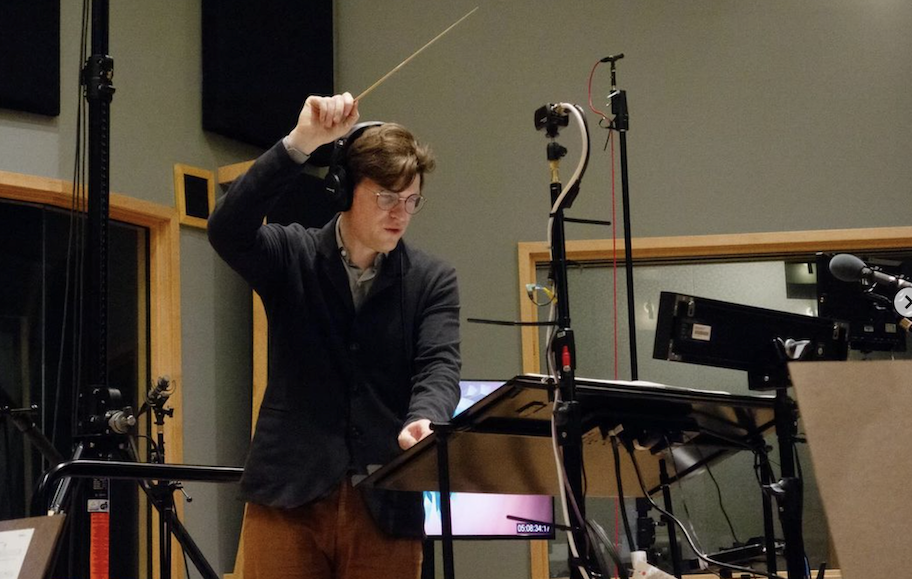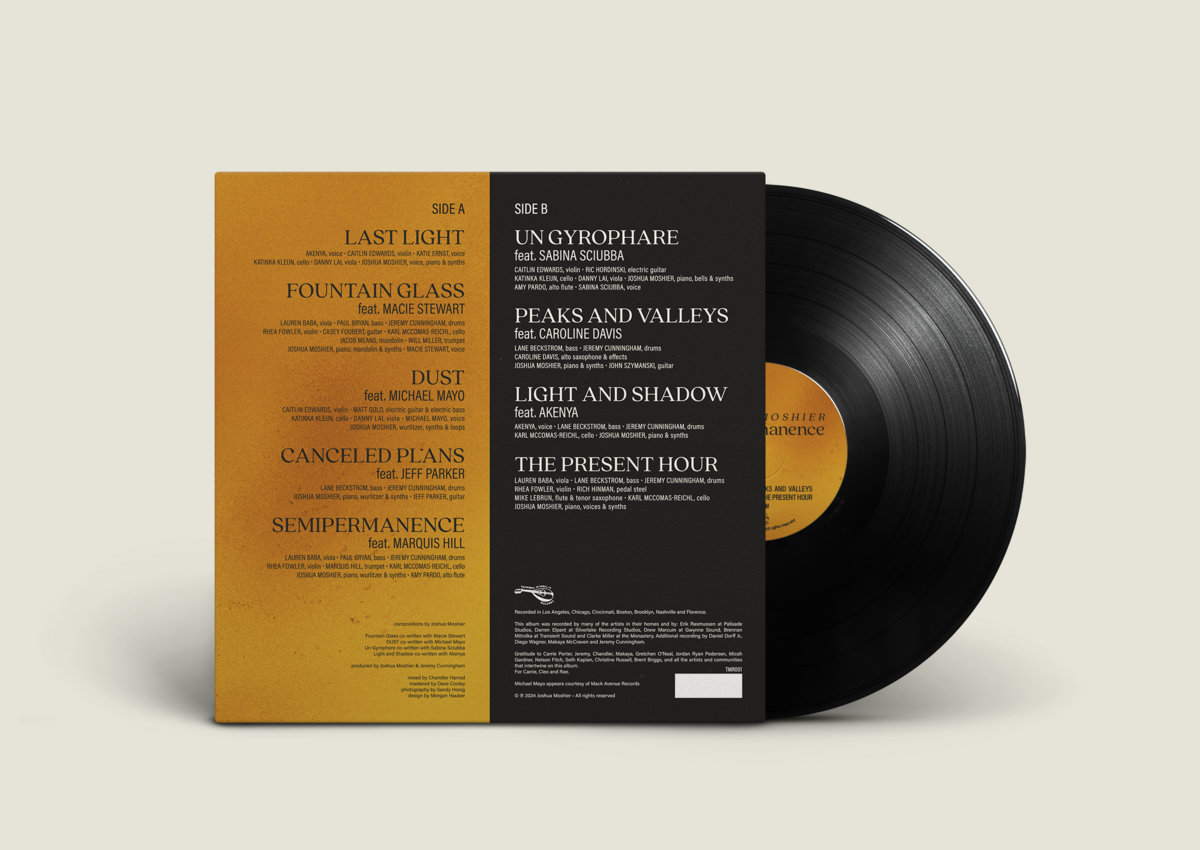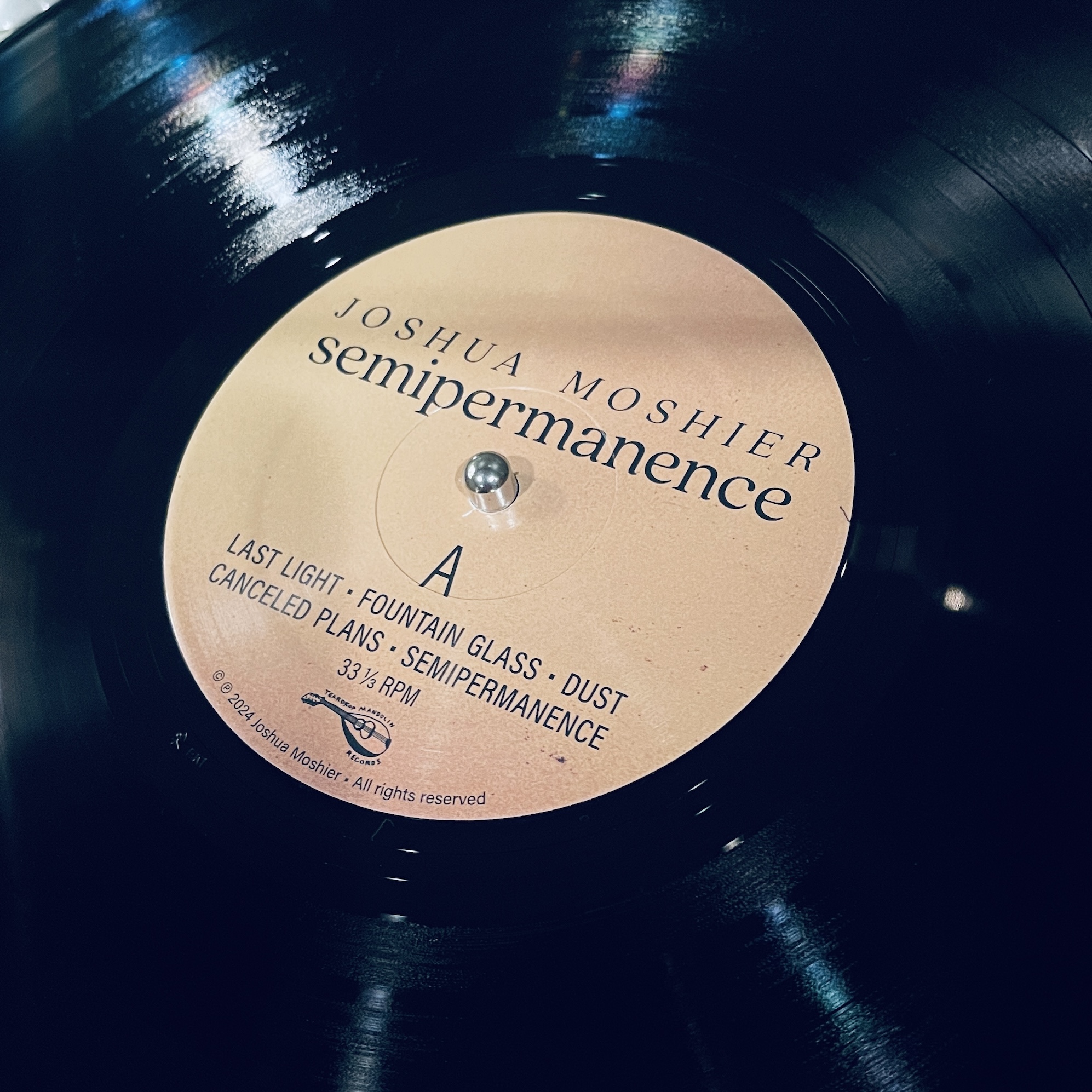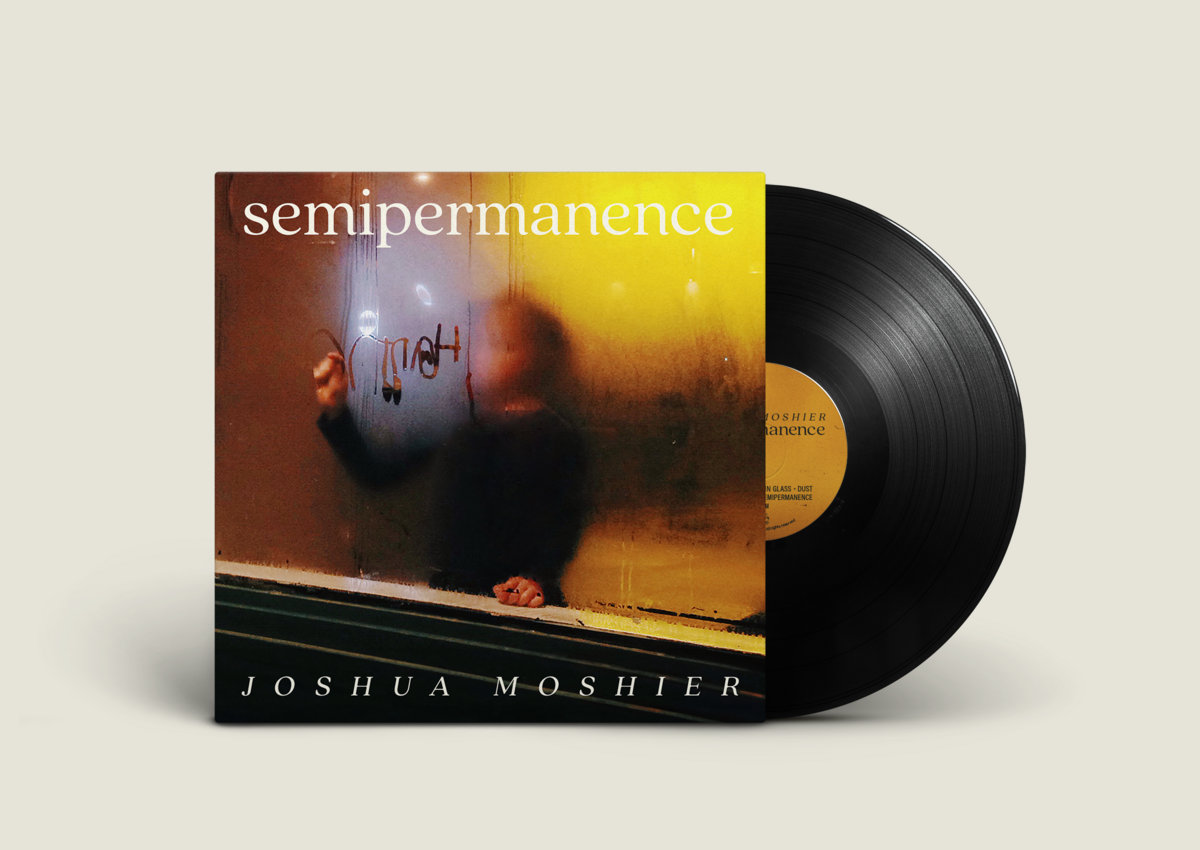Josh Moshier Explores the Semi-Permanent
An Interview and Review About His First Solo Album - "Semipermanence" - and Composing Career
Today, it’s rare to discover music without any prior knowledge of it. We usually have some vague sense of the genre, sound, or artist. But, I had no idea what to expect from Joshua Moshier before the needle hit his debut album’s grooves. It quickly became clear to me that Moshier is an exceptionally talented musician. And I further learned that he’s an Emmy-nominated composer, songwriter, and pianist who has crafted music for series, films, interactive media, and the stage, including work for Netflix, Peacock, FX, and other networks. While much of his work supports visual media created by others, his new album, Semipermanence, marks a shift where he takes creative control.
Primarily a keyboardist, Moshier has navigated various musical careers. Semipermanence reflects on his journey and revisits past collaborations and experiences, turning them into an album of personal memories—a chance to make those fleeting musical moments more enduring.
While the project is all Joshua’s and it encapsulates years of his work and experience, he decided to co-write four tracks on the album, “In my work composing for film and television, I increasingly find myself in situations where I am working with songwriters, often to write an instrumental track around lyrics that are presented to me. I wanted to flip this around, sending my instrumental music to songwriters I admire and seeing what we might come up with together.”
The album highlights Moshier's composing and arranging skill across various genres. It also promises surprises, yet maintains high quality and thoughtfulness throughout. The stylistic depth and breadth of the album’s compositions are wide, varied and echo Moshier’s influences, “one of the motivations in making this record is that while I love and create largely instrumental music, I usually go to vocal records first when I am listening for pleasure! Dinah Washington and Ray Charles are favorites of mine, and I love Duke Ellington’s long-form versions of his tunes with Eve Smith singing.”
 Photo By: Sally Ryan
Photo By: Sally Ryan
However, pop music of the 20th century plays an inspirational role, too, “Billy Preston is another big influence, and I especially adore his records that George Harrison produced (Encouraging Words, That’s the Way God Planned It). Those were sort of a spiritual template for my album, as well as the Ray Charles country and western records, where you’re putting together different genres and finding out what happens.”
Moshier has spent a great deal of time in Chicago. Because of this, his musical influences are also affected by Chi-town’s music scene: “there’s so much great music happening there: Jeff Tweedy, Macie and her band Finom, Jeremy Cunningham, Makaya McCraven— their records are ones I come back to again and again.”
Semipermanence’s opening track, “Last Light,” is introspective and meditative, almost modern classical, and seamlessly transitions into “Fountain Glass” (featuring Macie Stewart), a song with an indie pop feel. “Fountain Glass” is one of my favorites, capturing the essence of the album beautifully. Moshier explains more about the track, “For ‘Fountain Glass’ I wrote a first draft of lyrics that Macie Stewart truly elevated once she joined in, crystalizing the meaning in such a concise, poetic way. She sent back her vocals over email which really directed how the arrangement should come together. I work this way often on film scores too, so I always love opening up a folder of recordings from another musician and blending them into the tapestry of the composition.”
“DUST” (featuring Michael Mayo on vocals) merges pop fusion with the contemplative structure of “Looking Glass,” featuring a melody so meticulously crafted it could leave Brian Wilson swooning. Mayo’s vocals are reminiscent of a sweet blend of Carl and Brian. Van Dyke Parks also would appreciate the song’s slightly off-center melody and arrangement.
Moshier’s jazz influences shine in the brief but engaging, “Canceled Plans”. It features guitarist Jeff Parker, who adds sharp six-string stabs to the song's structure. His interplay with Moshier’s keyboards (he plays three of them on this tune) doesn’t break ground, but it is definitely fun.
The album's title track - “Semipermanence” - is both delicate and nostalgic, elegantly evolving from a Satie-inspired whisper to an engaging trumpet-driven jazz/rock groove, showcasing Moshier’s ability to execute skillful transitions. Trumpet player Marquis Hill features on this track. Great drum sound on this one, too. Numerous musicians join in before the song's abrupt conclusion. After all, it is semipermanent.

Sabina Sciubba performs on another of the album’s highlights. Her multilingual voice adds an intimate and engaging touch to “Un Gyrophare”. She co-wrote this track with Moshier and chose French to convey her lyrical message. Sciubba, best known for her work with the art/dance group Brazilian Girls, has recently gained recognition for her excellent solo albums and contributions to other artists' work, as she does here. She's a favorite of mine, and recently, I had the pleasure of interviewing her for her latest album. Sciubba is a singer who expresses both tenderness and confident strength in mere seconds. Moshier succinctly complements her tender, salon-like cabaret style.
“Sabina played a memorable character named Penelope on Baskets, a series I scored and which had an adventurous musical approach,” Moshier explains, “I had written an end titles cue for the episode “Thanksgiving” during the third season (Sabina’s character was not a part of that season), and the director Jon Krisel had the idea to send the cue over to Sabina for her to contribute vocals and lyrics, as a little cameo.” Joshua was impressed with what Sabina sent back, it was, “perfect and practically instantaneous — I couldn’t believe how easily it came together. So I remembered that experience when I was sketching ideas, hoping to send one to Sabina.”
The manner in which Moshier and Sciubba worked remotely offers a detailed peek into the experience of musicians composing remotely, “I sent her my piano sketch and she sent back her vocal just a week later, and then I built the arrangement around it, pulling out the piano piece by piece except for when it was most needed.”
While the process worked for him and Sciubba, let me remind you that Joshua worked remotely with several musicians on this project, “I assembled all the recordings in my home studio. The process comes right out of how I often create scores for television and film, and in some of those scores I’ve been assembling music from as many as 30 musicians!” It’s one thing to comprehend that he’s used to doing this, but how does the tracking process really work? Joshua explains, “The audio originates from all kinds of homes and studios but it all eventually finds a permanent home in Pro Tools. A lot of the songs on Semipermanence are a combination of sections recorded to click and sections recorded freely without click, so the piano was often a guide to the timing and the way the music breathes, even if the piano was removed later. It just takes a lot of communication with the players about how things need to be recorded and sent back.”
Post-production had its own set of tasks and challenges, “After I’d assembled, edited and done a first pass mix on each track, I sent the sessions over to Chandler Harrod, an incredible engineer and mixer I met at Capitol Studios in Los Angeles. I played him an early version of “DUST” when I was recording a score. He immediately connected with it, which was a big encouragement. He was the first person I thought of to mix the album and I’m forever grateful to him for his collaboration.”
The galloping “Peaks and Valleys,” with its Bacharach-inspired touches, would serve as a perfect end-credit song for a great film. Led by Caroline Davis on alto sax and effects, this track showcases a seasoned professional supported by equally skilled musicians, making it a standout on the album.
The album closes with the deceptively sparse “The Present Hour,” a piano piece with a uniquely organic sound characteristic. Again, we find Moshier pushing the boundaries even further into a post-modern realm. The beauty of the music matches its unexpected edge, much like life itself. It’s poignant, but not overly romantic or dramatic. The unexpected addition of pedal steel perfectly complements Moshier's composition. As Moshier tracked the final background vocals, he also recorded the serendipitous sound of chirping birds outside his window and seamlessly integrated their song into his.

Pressed at Gotta Groove Records in Cleveland, OH, the vinyl I auditioned is superb, there’s nary a pop or click in sight. The lower bass frequencies are warm and inviting, and the production and mix are thoughtfully executed, enhancing the album’s intimate and atmospheric qualities. A Mofi-style inner sleeve is also gratefully included in the package.
Moshier masterfully explored the concept of semi-permanence using precise craftsmanship that ensures a deliberate and well-considered project. Semipermanence may delve into the hazy realities of the now, but Moshier’s thematic and musical incisiveness offer us a profound glimpse into the temporal.








































.png)








